Fed-Up Redditor Decided To Teach Friend's Dog Some Manners, Gets Accused Of Breaking The Dog's Spirit And Changing His Personality
Manners are what make a man and a dog! You'll avoid a lot of future embarrassment by teaching your puppy some fundamental etiquette, and you'll both be able to enjoy every second of your time together.
Like human etiquette, manners exist to help people get along with one another. They are unspoken guidelines that, if followed, can prevent arguments and misunderstandings.
It's crucial to distinguish between politeness and obedience, as they are not at all the same. A polite dog can analyze the situation and decide how to act in an appropriate manner.
Both a human newborn and a puppy do not come into the world with decent manners. Therefore, your dog must learn how to behave properly around people and other canines.
A good friend of the OP's was going to be away for five weeks, and her 3-year-old male, unneutered dog would be staying with them. The dog, Monster, has no routine; he eats when he wants, plays all day, jumps on people and dogs he knows, and those he doesn't, among other things.
OP's dog has food allergies, and after a week of constantly having a ball thrust at them with very little sleep, OP decided to teach the dog some manners. OP's friend has now been home for a couple of weeks, and she is upset because OP has broken the dog's spirit.
Here's the story's headline

The dog has no routine, eats when he wants, and they just leave food out all the time; plus, OP's dog has food allergies.

The friend's dog is a clever little devil, and after a tricky few days, he started to get the hang of things.
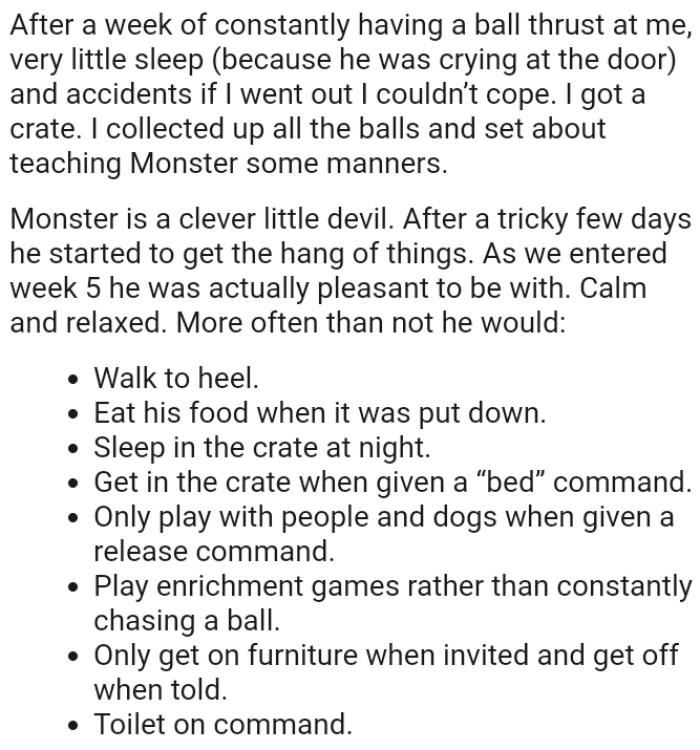
Understanding Dog Training Dynamics
Dr. Alice Thompson, a behavioral psychologist at UCLA, emphasizes that training a dog requires an understanding of both animal behavior and the human-animal bond.
Her research indicates that introducing new routines can sometimes be misconstrued as an attempt to change a dog's personality, leading to resistance or anxiety.
It's essential to approach training with sensitivity to the dog's established behaviors and emotional state.
OP's friend has now been home for a couple of weeks, and she is upset because OP has “broken his spirit.”
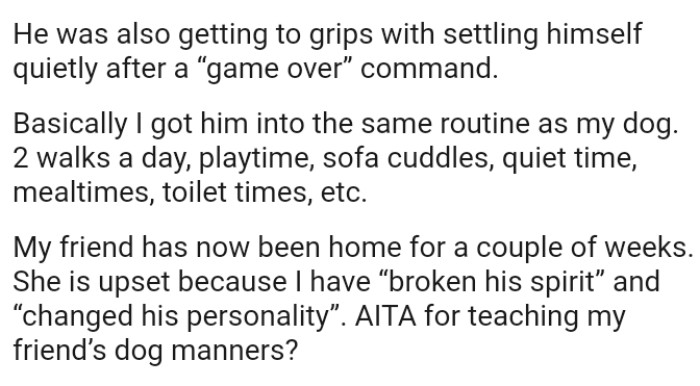
OP has offered the following explanation for why they think they might be the a-hole:
I trained my friend’s dog while I was looking after him—some basic commands and a daily routine. She says I have broken his spirit and changed his personality. AITA?
OP's friend is a neglectful dog owner and is probably having conflict with her dog.

Adults call it parenting, and this Redditor says it's necessary.
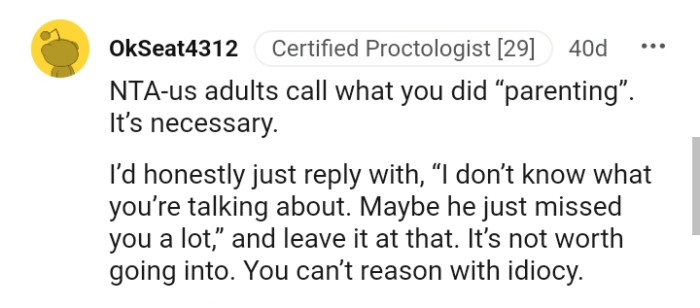
Studies on animal behavior reveal that dogs thrive on consistency and positive reinforcement.
According to research published in the Journal of Veterinary Behavior, understanding a dog's unique personality can greatly enhance training success.
This highlights the importance of creating a routine that respects the dog's individuality while also establishing necessary boundaries.
The OP is not obligated to put up with an untrained dog in her home.

This Redditor feels like the OP did the friend a service.

Telling the friend that they wouldn't be dog-sitting for them in the future.
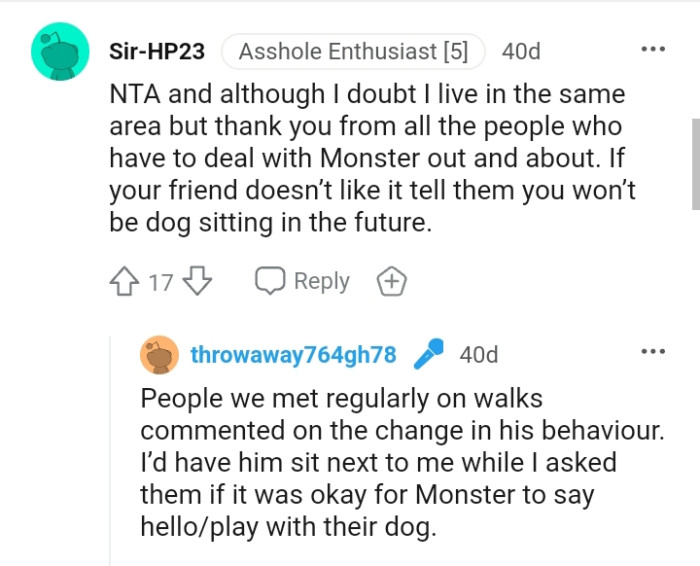
The Emotional Impact of Training
Training is not just about obedience; it's also about building a relationship rooted in trust and understanding.
Dr. John Archer, a psychologist specializing in human-animal interactions, notes that effective training fosters emotional bonds between pet and owner.
Research suggests that a positive reinforcement approach not only benefits the dog's behavior but also enhances the owner's emotional connection to their pet.
OP's friend's version of happy is just constant neuroticism.
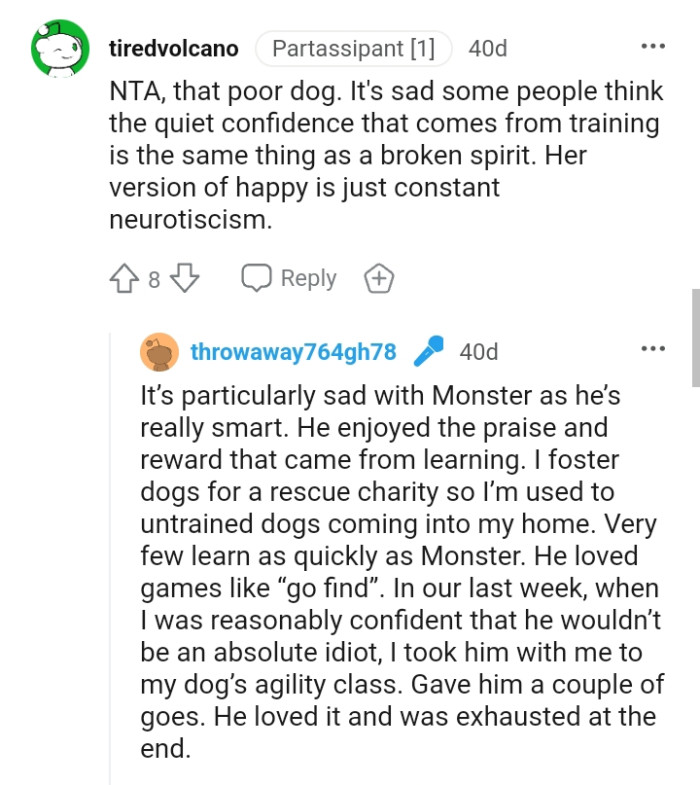
Expecting the OP to put up with those behaviors is unreasonable.

It sounds like the dog made a well-behaved boy.

Practical strategies for effective dog training include the gradual introduction of new commands and ensuring the training environment is calm and positive.
Establishing short, consistent training sessions can reduce stress for both the dog and the owner.
Additionally, incorporating play and rewards can create a more engaging and less intimidating learning experience.
When you teach them, you can use it when you're out and about.
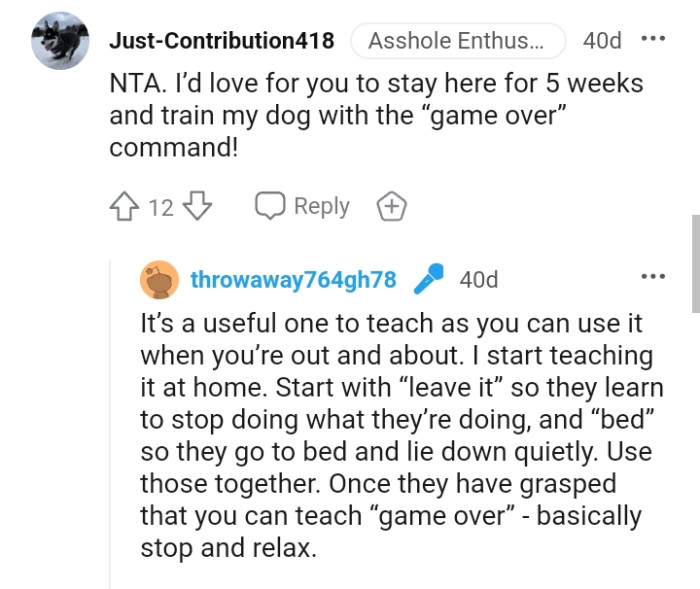
A puppy needs to begin learning at a very young age, much like we teach our kids fundamental etiquette from the beginning. A puppy's brain must process a vast amount of information, so its little brain has a lot to learn about the world and how to act in it.
The OP only taught the dog some manners, and many Redditors say that it's a good thing. The OP was declared, not the AH.
Psychological Analysis
This situation illustrates the complexities of dog training and the need to balance structure with compassion.
From a psychological standpoint, understanding the emotional needs of both the dog and the owner is essential for effective training.
Analysis generated by AI
Analysis & Alternative Approaches
Understanding the emotional dynamics in dog training is crucial for fostering a positive relationship between owners and their pets.
As noted by Dr. Michele Gelfand, a cultural psychologist, "Building a connection based on trust is essential for effective training; it’s not just about obedience but about understanding each other." By adopting a compassionate approach, both owners and dogs can thrive together.



